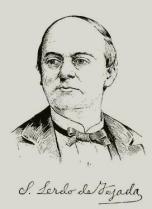Lerdo de Tejada, Miguel (1812-1861)

Born in Veracruz, Veracruz on July 16, 1812, of a Mexican
mother and a Spanish father, who was a town councilman. His older brother, Sebastián,
was eight years older and would become President of Mexico. Miguel was
educated in Veracruz and developed an interest in statistics and public affairs,
perhaps because of his father's civic work. As a young man, he became a Liberal
Party activist.
He was elected president the government of Mexico City in
1852 and was an able public administrator. In 1853, he became the Minister of
Development during the Mariano Arista's presidency . It was during these years
that his books, Historia de Veracruz and Historia del Comercio
Exterior de México, were published. When the Liberals ousted Antonio
López de Santa Anna in 1855, he became Secretary of Development under
interim presidents General
Martín Carrera from August 15th to September 12th and Rómulo Díaz de la Vega, September 12th
to October 4th.. When General
Juan Alvarez became president in October, 1855, Lerdo became under-secretary of public
works; in May, 1856, he became Foreign Secretary from November 13 to December
24, 1856 and then Finance Minister under President
Ignacio Comonfort. He first went after church property in Puebla state
and, when that was successful, he issued the Ley
Lerdo on June 25th, a financial measure forbidding the clergy and public
corporations to hold landed property except that used in day-to-day
ecclesiastical operations. Over the centuries, the Church had accumulated vast
landed estates, many of which were not as productive as they might be, and its
property made it a political power. Lerdo's plan was to have these auctioned off
to get titles into secular and the revenue for the government in the form of a
transfer tax. Comonfort signed the decrees but was very uncomfortable with them.
When conservatives, large property owners, and churchmen protested, Lerdo
resigned his position on January 3, 1857. He supported Comonfort in the
presidential elections which also saw Benito
Juárez become chief justice of the Supreme Court, the next in line for the
presidency. When the uproar got too heated, Comonfort resigned in 1858 the
face of a coup by the conservative General
Félix Zuloaga. Juárez and his erstwhile government fled to Veracruz, a
Liberal stronghold, and Lerdo became his finance minister from January 3
to July 15, 1859 and again from December 19, 1859 to May 31, 1860. In June, he
was sent to the United States to try to sell bonds based on nationalized church
properties. The mission was unsuccessful. He returned to Mexico. Lerdo was elected by popular vote judge of the supreme court. In the
1861 elections for the presidency in 1861, he got he electoral
votes of five states, while Gonzalez Ortega had five and Juárez six states. He withdrew and died
in the Tucubaya suburb of Mexico City on March 22, 1861.
Don Mabry
121103

